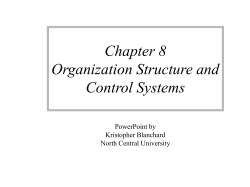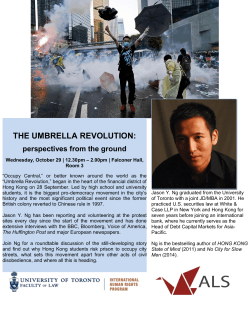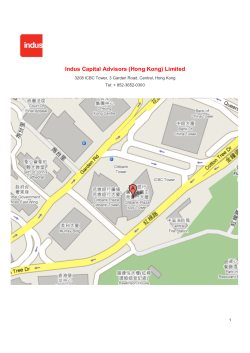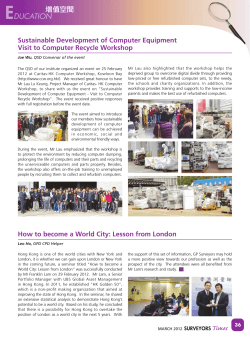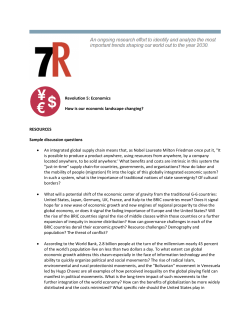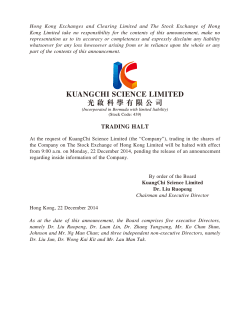
Globalization and Cultural Production
The Chinese University of Hong Kong Department of Cultural and Religious Studies 2nd Semester, 2014-2015 CURE3017 Globalization and Cultural Production Course Outline Lecturer: Dr. Chan Ka Ming (e-mail address: chankm_teaching@yahoo.com.hk) Content of the Course Is globalization homogenizing or diversifying our perception of the world? Is our world having loosening or tightening human relationship in globalized culture? Is the globalized culture sharing dreams or nightmares with ordinary people and humanity? Cultural studies, claimed by Michel de Certeau, is a study of everyday life. It is thus an entry into our mundane world for understanding and critical analysis. Globalization is having impact in all aspects of our life. Some people criticize that globalization would just flourish with commerce and business. However some of the others just enjoy the closeness between peoples brought by global technological advancement. Studying culture is unavoidably a study of globalization in which we can have critical exploration of how our life is shaped in this trend of human development. This course focuses on four areas of study, through which we can explore the different aspects of globalization and cultural production. These areas are: A. “World War Z” – Globalization, Theories and Concepts (Lecture A1-A2) B. “War of the Worlds” – Production, Running and Working in the ‘Runaway world’ (Lecture B1-B4) C. “The Lost World” – Reception, Reading and Misreading the world (Lecture C1-C4) D. “The World is Not Enough” – Joy to the World?! (Lecture D1-D3) Each area covers a set of cultural and social discussion. Area A tackles theories and concepts of globalization. They uncover the transformation of understanding the world. Area B discusses the issues of production for seeing the changes of the world. These issues are related to Fordism and 1 McDonaldization, and the work in the (post)modern world for the creative and media industry. By opening these discussions, we can see how our lifestyles and culture are shaped and have impact in globalization. Area C further deals with how we consume and receive these cultural productions. Cases of circulation of Hong Kong and overseas film and popular culture, theme park and tourism, and shopping malls and fashion will shed lights on (mis)reading globalized phenomenon. Area D introduces movement, in social and technological action, for resisting and regenerating the globalized trend. This is the end of the course but this is also a never-ending action in cultural studies. Learning Outcomes: On successful completion of the course, students are expected to be able to: 1. Explain globalization with cultural studies perspective; 2. Identify the key issues and concerns of globalization; 3. Understand the critical approach in assessing globalization; 4. Enrich the angle of understanding culture and society. Medium of Instruction: Cantonese (with teaching material in English) Teaching / learning activities: Lectures, presentation and discussion Assessment: 1. Lecture and Tutorial Attendance (10%) Students are expected to attend 80% of all classes. 2. Tutorial Presentation and Discussion (20%) Students will be divided into groups in tutorial and have to decide a topic for presentation. This is to refresh the topics and issues discussed in lectures. At the end of presentation, the presenters are expected to run a “Question & Answer” section for follow-up discussion. Tutorial will start on the week 3 and will be run in separated weeks. There will be 5 to 6 tutorials for the whole course. 3. Mid-term Paper (30%) of 1000-3000 words: Deadline – 17th February 2015 Mid-term paper shall be submitted after Lecture Area B. Students are encouraged to decide their interested topic (which is closely linked to the course) for writing an analytical essay. 4. Final Paper (40%) of 2000-4000 words: Deadline – 28th April 2015 Final paper shall be submitted after the end of the course. Students are encouraged to decide the topic for broadening the analytical framework and examining issues or phenomenon linked to the course. 2 Teaching Period: 5 January – 17 April 2015 Day, Time and Venue of Lecture: Tuesday 2:30 - 4:15p.m. 李兆基樓LSK 201 Tutorial: Starting from week 3 or 4, time and schedule to be confirmed later. Teaching Calendar Sunday Week 1 4 January Monday 5 Tuesday 6 Wednesday Thursday Friday Saturday 7 8 9 10 14 15 16 17 21 22 23 24 28 29 30 31 4 5 6 7 11 12 13 14 17 Mid-term 18 Lunar NY 19 20 21 Lecture C1 Holiday starts 24 Lunar NY 25 26 27 28 4 5 6 7 11 12 13 14 18 19 20 21 25 26 27 28 1 April 2 3 Lecture A1 Week 2 11 12 13 Lecture A2 Week 3 18 19 20 Lecture B1 Week 4 25 26 27 Lecture B2 Week 5 1 February 2 3 Lecture B3 Week 6 8 9 10 Lecture B4 Week 7 Week 8 15 22 16 23 Holiday ends Week 9 1 March 2 3 Lecture C2 Week 10 8 9 10 Lecture C3 Week 11 15 16 17 Lecture C4 Week 12 22 23 24 Lecture D1 Week 13 29 30 31 Lecture D2 Week 14 5 6 Ching Ming Week 15 12 7 Easter Easter 4 Holiday starts 8 9 10 11 15 16 17 18 Holiday ends 13 14 Lecture D3 Week 16 19 20 21 22 23 24 25 Week 17 26 27 28 Final due 29 30 1 May 2 3 Lectures Area A “World War Z” – Globalization, Theories and Concepts Week 1. Lecture A1, Introduction: (6th January, 2015) Is the world making zombie? - Questioning globalization Reading: Du Gay, Paul. Doing Cultural Studies: the Story of the Sony Walkman. London: SAGE Publications, 1997. (Section 1 – Making Sense of the Walkman; Section 2 – The Production of the Sony Walkman.) Pieterse, Jan Nederveen. Globalization and Culture: Global Mélange. New York: Rowman & Littlefield, 2004. (Chapter 1 – Globalization: Consensus and Controversies.) (13th January, 2015) Lecture A2: Is the global zombie mutating? Week 2. - Discoursing globalization Reading: Harvey, David. Spaces of Hope. Berkeley: University of California Press, 2000. (Chapter 4 – Contemporary Globalization.) Hardt, Michael and Negri, Antonio. Empire. Cambridge: Harvard University Press, 2000. (Chapter 1.1 – World Order, Chapter 2.1 – Two Europes, Two Modernities, Chapter 3.1 – The Limit of Imperialism.) Robertson, Roland. Globalization: Social Theory and Global Culture. London: SAGE Publications, 1992. (Chapter 4 – World-Systems Theory, Culture and Images of World Order.) Area B “War of the Worlds” – Production, Running and Working in the ‘Runaway world’ Week 3. Lecture B1: (20th January, 2015) Is McDonald loving you? - Producing (in) globalization Reading: Edgell, Stephen. The Sociology of Work: Continuity and Change in Paid and Unpaid Work. London: SAGE Publications, 2012. (Chapter 5 –Industrial Work: Fordism, Neo-Fordism and Post-Fordism; Chapter 6 – Service Work: Fordism, Neo-Fordism and Post-Fordism.) Ritzer, George. The McDonaldization of Society. 20th Anniversary Ed. London: SAGE Publications, 2013. (Chapter 1 – An Introduction to McDonaldization; Chapter 2 – The Past, Present, and Future of McDonaldization: From the Iron Cage to the Fast-Food Factory and Beyond.) 4 (27th January, 2015) Lecture B2: Is Fordism killing you? - Working (in) globalization Week 4. Reading: Bryman, Alan. “The Disneyization of Society” In McDonaldization: The Reader, edited by George Ritzer, 52-59. London: SAGE Publications, 2002. Newman, Katherine S. Falling from Grace: Downward Mobility in the Age of Affluence. Berkeley: University of California Press, 1999. (Chapter 2 – Downward Mobility in the Age of Affluence; Chapter 3 – Rejected Managers and the Culture of Meritocracy.) Sennett, Richard. The Corrosion of Character: The Personal Consequences of Work in the New Capitalism. New York: W.W. Norton, 1998. (Chapter 2: Routine; Chapter 5 – Risk; Chapter 6 – The Work Ethics; Chapter 7 – Failure.) (3rd February, 2015) Lecture B3: Is Creativity saving you? Week 5. - Relaxing (in) globalization Reading: Caldwell, John Thornton. Production Culture: Industrial Reflexivity and Critical Practice in Film and Television. Durham and London: Duke University Press, 2008. (Chapter 3: Trade Images and Imagined Communities [Below the Line].) Crang, Mike. Cultural Geography. New York: Routledge, 1998. (Chapter 9: Culture of Production.) Lazzarato, Maurizio, “Immaterial Labour” In Radical Thought in Italy: A Potential Politics, edited by Paolo Virno and Michael Hardt, 133-50. Minneapolis, Minn.: University of Minnesota Press, 1996. (10th February, 2015) Week 6. Lecture B4: Is Logo comforting you? - Branding (in) globalization Reading: Harbord, Janet. Film Cultures. London: SAGE Publications, 2002. (Chapter 4: Marketing films and audiences; Chapter 5: Postmodern praxes: production on the national and global stage.) Klein, Naomi. No Logo: No Space, No Choice, No Jobs. New York: Picador, 2002. (Chapter 1: New Branded World; Chapter 2: The Brand Expands – How the Logo Grabbed Center Stage; Chapter 6: Brand Bombing – Franchises in the Age of the Superbrand.) Ready to submit Mid-term Paper? Deadline: 17th February, 2015 5 Area C “The Lost World” – Reception, Reading and Misreading the world Week 7. Lecture C1: (17th February, 2015) How do Beatles move the world and Wynners move Hong Kong? - Popularizing in globalization Reading: Buxton, David. "Rock Music, the Star System, and the Rise of Consumerism." In On Record: Rock, Pop, and the Written Word, edited by Simon Frith and Andrew Goodwin, 427-40. London: Routledge, 1990. Ehrenreich, Barbara, Elizabeth Hess, and Gloria Jacobs. "Beatlemania: Girls Just Want to Have Fun." In The Adoring Audience: Fan Culture and Popular Media, edited by Lisa A. Lewis, 84-106. London: Routledge, 1992. Mahtani, Minelle and Scott Salmon. "Site Reading?: Globalization, Identity, and the Consumption of Place in Popular Music" In Popular Culture: Production and Consumption, edited by C. Lee Harrington and Denise Bielby, 165-79. Oxford: Blackwell, 2001. Lecture C2: (3rd March, 2015) How do Jay Chou (周杰倫) dress in Green (Green Hornet) and Lee Byung Hun ( 李秉憲) kill in Red (Red 2) ? - Acting in Hollywood Week 8. Reading: Fore, Steve. "Jackie Chan and the Cultural Dynamics of Global Entertainment." In Transnational Chinese Cinemas: Identity, Nationhood, Gender, edited by Sheldon Hsiao-Peng Lu, 239-62. Honolulu: University of Hawaii Press, 1997. Giardina, Michael D. "Global Hingis: Flexible Citizenship and the Transnational Celebrity." In Sport Stars: The Cultural Politics of Sporting Celebrity, edited by David L. Andrews and Stevens J. Jackson, 201-17. London: Routledge, 2001. Lo, Kwai-Cheung. Chinese Face/Off: The Transnational Popular Culture of Hong Kong. Urbana: University of Illinois Press, 2005. (Chapter 5: Charlie Chan Reborn as Jackie Chan in Hollywood-Hong Kong Representations.) Lecture C3: (10th March, 2015) How do Disney become wonderland and Chungking become forest? - Exoticizing in Hong Kong Week 9. Reading: Foglesong, Richard. "Walt Disney World and Orlando: Deregulation as a Strategy for Tourism" In The Tourist City, edited by Dennis R. Judd and Susan S. Fainstein, 89-106. London: Yale University Press, 1999. Hall, Stuart. “The Spectacle of the ‘Other’” In Representation: Cultural Representations and Signifying Practices, edited by Stuart Hall, 223-79. London: SAGE Publications, 1997. 6 Mathews, Gordon. Ghetto at the Center of the World. Hong Kong: Hong Kong University Press, 2011. (Chapter 1: Place; Chapter 5 – Future.) Sassen, Saskia and Frank Roost. "The City: Strategic Site for the Global Entertainment Industry" In The Tourist City, edited by Dennis R. Judd and Susan S. Fainstein, 143-54. London: Yale University Press, 1999. Urry, John and Jonas Larsen. The Tourist Gaze 3.0. London: SAGE, 2011. (Chapter 4: Working under the Gaze; Chapter 5 – Changing Tourist Culture; Chapter 6 – Places, Buildings and Design.) Lecture C4: (17th March, 2015) How do My Love from the Star (來自星星的你) touch Asians and I am a Singer? (我是歌手) touch Chinese? - Recentering in Media Week 10. Reading: Iwabuchi, Koichi. Recentering Globalization: Popular Culture and Japanese Transnationalism. Durham: Duke University Press, 2002. (Chapter 1: Taking "Japanization" seriously: Cultural globalization reconsidered; Chapter 2: Trans/nationalism: The discourse on Japan in the global cultural flow.) Kellner, Douglas. Media Spectacle. London: Routledge, 2003. (Chapter 3: The sports spectacle, Michael Jordan, and Nike.) Leung, Lisa Yuk-ming. "Ganbaru and its transcultural audience: imaginary and reality of Japanese TV dramas in Hong Kong " In Feeling Asian Modernities: Transnational Consumption of Japanese TV Dramas, edited by Koichi Iwabuchi, 89-106. Hong Kong: Hong Kong University Press, 2004. Area D “The World is not Enough” – Joy to the world?! Week 11. Lecture D1: (24th March, 2015) Why does Facebook like you? - Technologizing globalization Reading: Appadurai, Arjun. Modernity at Large: Cultural Dimensions of Globalization. Minneapolis, Minn.: University of Minnesota Press, 1996. (Chapter 2: Disjuncture and Difference in the Global Cultural Economy; Chapter 3: Global Ethnoscapes: Notes and Queries for a Transnational Anthropology.) Mohammed, Shaheed Nick. Communication and the Globalization of Culture: Beyond Tradition and Borders. Lanham: Lexington Books, 2011. (Chapter 4: Neo-imperialism, Media, and Culture; Chapter 5: New Mythology, New Media, and the Globalization of Culture.) Richardson, Ingrid, “Sticky Games and Hybrid Worlds: A Post-phenomenology of Mobile Phones, Mobile Gaming and the iPhone" In Gaming cultures and place in Asia-Pacific, edited by Larissa Hjorth and Dean Chan, 213-36. London: Routledge, 7 2009. (31st March, 2015) Lecture D2: Why does the Nature hug you? - Greening globalization Week 12. Reading: Castellsi, Manuel. The Power of Identity. Malden, Mass: Blackwell, 1997. (Chapter 3: The Greening of the Self: the Environmental Movement.) Christoff, Peter, “Ecological Citizens and Ecologically Guided Democracy" In Democracry & Green Political Thought: Sustainability, Rights and Citizenship, edited by Brian Doherty and Marius de Geus, 151-69. London: Routledge, 1996. Harvey, David, “What’s Green and Makes the Environment Go Round" In The Cultures of Globalization, edited by Fredric Jameson and Masao Miyoshi, 327-55. Durham, N.C.: Duke University Press, 1998. (14th April, 2015) Lecture D3: Why does Revolution push you? - Moving globalization Week 12. Reading: Hill, Symon. Digital Revolutions: Activism in the Internet Age. Oxford: New Internationalist, 2013. (Chapter 6: Cyberactivism Explodes; Chapter 7: Fighting Corporations in Cyberspace.) Choudry, Aziz, “Global Justice? Contesting NGOization: Knowledge Politics and Containment in Antiglobalization Networks” In Learning from the Ground up: Global Perspectives on Social Movements and Knowledge Production, edited by Aziz Choudry and Dip Kapoor, 17-34. New York: Palgrave Macmillan, 2010. Robotham, Don. Culture, Society and Economy: Bringing Production Back In. London: SAGE Publication, 2005. (Chapter 8: Alternatives: A Global Approach to Anti-Globalization; Chapter 9: The Noisy Sphere and the Hidden Abode.) End of the course Ready to submit Final Paper? Deadline: 28th April, 2015 References Andrews, David L. and Stevens J. Jackson. ed. Sport Stars: The Cultural Politics of Sporting Celebrity. London: Routledge, 2001. Appadurai, Arjun. Modernity at Large: Cultural Dimensions of Globalization. Minneapolis, Minn.: University of Minnesota Press, 1996. Axford, Barrie and Richard Huggins. ed. Cultures and / of Globalization. Cambridge: Cambridge Scholars Publishing, 2011. Beck, Ulrich. What is Globalization? Cambridge: Polity Press, 2002. 8 Bell, Daniel. The Cultural Contradictions of Capitalism: 20th Anniversary Edition. New York: Basicbooks, 1996. Berry, Chris, Nicola Liscutin and Jonathan D. Mackintosh. ed. Cultural Studies and Cultural Industries in Northeast Asia. Hong Kong: Hong Kong University Press, 2009. Bhabha, Homi K. The Location of Culture. London: Routledge, 1994. Caldwell, John Thornton. Production Culture: Industrial Reflexivity and Critical Practice in Film and Television. Durham and London: Duke University Press, 2008. Castells, Manuel. The Power of Identity. Malden, Mass: Blackwell, 1997. Choudry, Aziz and Dip Kapoor. ed. Learning from the Ground up: Global Perspectives on Social Movements and Knowledge Production. New York: Palgrave Macmillan, 2010. Crang, Mike. Cultural Geography. London: Rouledge, 1998. Crothers, Lane. Globalization and American Popular Culture. 3rd edition. Lanham: Rowman & Littlefield Publishers, 2013. De Certeau, Michel. The Practice of Everyday Life. Berkeley: University of California Press, 1988. Doherty, Brian and Marius de Geus. ed. Democracry & Green Political Thought: Sustainability, Rights and Citizenship. London: Routledge, 1996. Du Gay, Paul. Doing Cultural Studies: the Story of the Sony Walkman. London: SAGE Publications, 1997. Edgell, Stephen. The Sociology of Work: Continuity and Change in Paid and Unpaid Work. London: SAGE Publications, 2012. Escobar, Arturo. Encountering Development: The Making and Unmaking of the Third World. Princeton, NJ: Princeton University Press, 1995. Frith, Simon and Andrew Goodwin. ed. On Record: Rock, Pop, and the Written Word. London: Routledge, 1990. Hall, Gary and Clare Birchall, ed. New Cultural Studies: Adventures in Theory. Athens: The University of Georgia Press, 2006. Hall, Stuart. Representation: Cultural Representations and Signifying Practices. London: SAGE Publications, 1997. Harbord, Janet. Film Cultures. London: SAGE Publications, 2002. Hardt, Michael and Negri, Antonio. Empire. Cambridge: Harvard University Press, 2000. Harrington, C. Lee and Denise Bielby. ed. Popular Culture: Production and Consumption. Oxford: Blackwell, 2001. Harvey, David. Seventeen Contradictions and the End of Capitalism. New York: Oxford University Press, 2014. -------. Spaces of Hope. Berkeley: University of California Press, 2000. -------. The Condition of Postmodernity. Malden: Blackwell Publishing, 1990. Hill, Symon. Digital Revolutions: Activism in the Internet Age. Oxford: New Internationalist, 2013. Hjorth, Larissa and Dean Chan. ed. Gaming cultures and place in Asia-Pacific. London: Routledge, 2009. Iwabuchi, Koichi. ed. Feeling Asian Modernities: Transnational Consumption of Japanese TV Dramas. Hong Kong: Hong Kong University Press, 2004. 9 -------. Recentering Globalization: Popular Culture and Japanese Transnationalism. Durham: Duke University Press, 2002. Jameson, Fredric and Masao Miyoshi. ed. The Cultures of Globalization. Durham, N.C.: Duke University Press, 1998. Jameson, Fredric. Postmodernism or, the Cultural Logic of Late Capitalism. Durham: Duke University Press, 1991. Judd, Dennis R. and Susan S. Fainstein. ed. The Tourist City. London: Yale University Press, 1999. Kellner, Douglas. Media Spectacle. London: Routledge, 2003. Klein, Naomi. No Logo: No Space, No Choice, No Jobs. New York: Picador, 2002. Lash, Scott and John Urry. Economies of Signs and Space. London: SAGE Publications, 2002. Lefebvre, Henri. The Production of Space. Malden: Blackwell Publishing, 1991. Lewis, Lisa A. ed. The Adoring Audience: Fan Culture and Popular Media. London: Routledge, 1992. Lo, Kwai-Cheung. Chinese Face/Off: The Transnational Popular Culture of Hong Kong. Urbana: University of Illinois Press, 2005. Lu, Sheldon Hsiao-Peng. ed. Transnational Chinese Cinemas: Identity, Nationhood, Gender. Honolulu: University of Hawaii Press, 1997. Mathews, Gordon. Ghetto at the Center of the World. Hong Kong: Hong Kong University Press, 2011. Mohammed, Shaheed Nick. Communication and the Globalization of Culture: Beyond Tradition and Borders. Lanham: Lexington Books, 2011. Newman, Katherine S. Falling from Grace: Downward Mobility in the Age of Affluence. Berkeley: University of California Press, 1999. Ong, Aihwa. Flexible Citizenship: The Cultural Logics of Transnationality. Durham and London: Duke University Press, 1999. Pieterse, Jan Nederveen. Globalization and Culture: Global Mélange. New York: Rowman & Littlefield, 2004. Piketty, Thomas. Capital in the Twenty-First Century. Cambridge: The Belknap Press of Harvard University Press, 2014. Ritzer, George. ed. McDonaldization: The Reader. London: SAGE Publications, 2002. -------. The McDonaldization of Society. 20th Anniversary Ed. London: SAGE Publications, 2013. Robertson, Roland. Globalization: Social Theory and Global Culture. London: SAGE Publications, 1992. Robotham, Don. Culture, Society and Economy: Bringing Production Back In. London: SAGE Publications, 2005. Sennett, Richard. The Corrosion of Character: The Personal Consequences of Work in the New Capitalism. New York: W.W. Norton, 1998. Soja, Edward W. Postmodern Geographies: The Reassertion of Space in Critical Social Theory. 4th ed. London: Verso, 1994. Tomlinson, John. Globalization and Culture. Chicago: the University of Chicago Press, 1999. Urry, John and Jonas Larsen. The Tourist Gaze 3.0. London: SAGE, 2011. 10 Virno, Paolo and Michael Hardt. ed. Radical Thought in Italy: A Potential Politics. Minneapolis, Minn.: University of Minnesota Press, 1996. Wilson, Rob and Wimal Dissanayake, ed. Global / Local: Cultural Production and the Transnational Imaginary. 3rd ed. Durham and London: Duke University Press, 2005. Žižek, Slavoj. In Defense of Lost Causes. London: Verso, 2008. -------. Living in the End Times. London: Verso, 2011. Honesty in Academic Work: A Guide for Students and Teachers The Chinese University of Hong Kong places very high importance on honesty in academic work submitted by students, and adopts a policy of zero tolerance on cheating and plagiarism. Any related offence will lead to disciplinary action including termination of studies at the University. All student assignments in undergraduate and postgraduate programmes should be submitted via VeriGuide with effect from September 2008: https://veriguide2.cse.cuhk.edu.hk/cuhk/ Although cases of cheating or plagiarism are rare at the University, everyone should make himself/herself familiar with the content of this website and thereby help avoid any practice that would not be acceptable. Section 1 What is plagiarism http://www.cuhk.edu.hk/policy/academichonesty/p01.htm Section 2 Proper use of source material http://www.cuhk.edu.hk/policy/academichonesty/p02.htm Section 3 Citation styles http://www.cuhk.edu.hk/policy/academichonesty/p03.htm Section 4 Plagiarism and copyright violation http://www.cuhk.edu.hk/policy/academichonesty/p04.htm Section 5 CUHK regulations on honesty in academic work http://www.cuhk.edu.hk/policy/academichonesty/p05.htm Section 6 CUHK disciplinary guidelines and procedures http://www.cuhk.edu.hk/policy/academichonesty/p06.htm Section 7 Guide for teachers and departments http://www.cuhk.edu.hk/policy/academichonesty/p07.htm Secton 8 Recommended material to be included in course outlines http://www.cuhk.edu.hk/policy/academichonesty/p08.htm Section 9 Electronic submission of assignments via VeriGuide http://www.cuhk.edu.hk/policy/academichonesty/p09.htm Section 10 Declaration to be included in assignments http://www.cuhk.edu.hk/policy/academichonesty/p10.htm 11
© Copyright 2025
